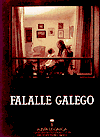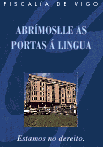Galician in the administration
The consolidation of the local administration based on the political autonomy of Galicia has brought with it the use of Galician as the means of communication between citizens and the different social, economic, political and cultural sectors of the country.
The Autonomous Administration is under the obligation to promote the widespread use of Galician, not only because of the legislation, but also because this language is the vernacular of the country it governs and it gives prestige with relation to other administrative bodies.
Promotion and encouragement of the use of Galician at all levels of public
life is regulated by the General Direction of Language Policy, part
of the Education and Universities Council. This organisation was helped
in its task by the creation in 1990 of the Coordinating Committee for Linguistic Normalization, which was designed to coordinate and support the activities of the different Councils in this area, that is, to reach those public sectors where the Directorate General had no competence.
The activity of the administration centred on the importance given to staff
training through courses, for both beginners and improvers, designed to
given oral and written competence in Galician so that citizens' needs could
be satisfied and information provided in this language. Stress was given
to the education area, but these services were provided in all the central
departments and delegations of the Councils. Courses were also given for
the staff of town halls, provincial government offices, the military administration,
etc.
The extension and standardisation of the Galician language in the public
administration, the linguistic training of staff and collaboration in the
stabilisation of the technical, legal and administrative language are the
objectives behind the creation of the Escola Galega de Administración
Pública (Galician School for Public Administration). Since 1993 this
School holds a specialised section for Galician language normalization and standarisation in the field of the administration.
Specific actions were taken in certain sectors, such as housing, transport,
town planning, public works, fishing and shellfish collection. In addition
to language courses, forms, letters and circulars were published, departments
were renamed and labelled, information campaigns were carried out and vocabulary lists drawn up. In the area of health, the public receives attention in both oral and written Galician. Access to any public administration post
includes tests in the Galician language to guarantee a minimum knowledge.
The sector of the administration which is closest to the citizens and with
which there is direct linguistic contact, both oral and written, is the
municipal government. The task of standardisation can therefore be most
effective through the local administration. Several town halls - Redondela,
Fene, Givo, Santiago, Moaña, Narón, Allariz, Cervo, Vilalba,
Cangas, Pontedeume and others- created Departments for Linguistic Normalization, with at least one specialist in Galician, which were partially subsidised in some cases by the Autonomous Government and in others by the respective town council alone. The functions carried out by the local institution were on two levels: one internal, with the translation of forms and writing of minutes, edicts, notices, etc in Galician; and the other external, offering linguistic advice to the public and guaranteeing the presence of the Galician language in all municipal activities of a public nature, necessary to establish a shared concern for the language by the local people.
The Linguistic Normalization Departments within the Provincial Governments
reflect their concern for the linguistic conflict. The first steps towards
normalization were given through their cultural, sporting and leisure
activities.
The presence of the Galician language in legal spheres gives it social prestige. The determination shown by the bodies of the Administration of Justice led to an agreement for cooperation with the Autonomous Government for the creation of the "Gabinete de Traducción e Asesoramento Lingüístico"
(Department for Translation and Linguistic Advice) within the Higher Court
of Justice. At the same time, the network of interpreters and linguistic
advisers was increased throughout Galicia and courses in Galician were held
periodically. All the judicial bodies and lawyers' associations received
information with samples of the most common forms and legal documents in
Galician.
Non-institutional campaigns have also been carried out in the area of normalization by associations such as the Mesa pola Normalización Lingüística and the Asociación de Funcionarios pola Normalización Lingüística. These associations have a leading role in the field of promotion and encouragement of the use of Galician maintaining different alternatives for the standarisation and normalization of the language.
The municipal government
is the sector of administration
which is closest to the citizens. |
|

"Fálalle galego" (Talk to her/him in Galician) was one of the first campaigns undertaken by the GDPL.

Special programmes were designed for the civil servants in order to achieve the normalization of Galician within the administration.

Groups in defence of the language and professional associations have a leading role in the process of normalization of the Galician language.
 |

